Newsletter


Our Newsletter
Connections
Oct
28
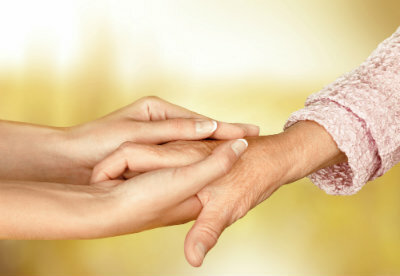
National Alzheimer’s Disease Awareness Month
November is National Alzheimer’s Disease Awareness Month. Today, 5.4 million Americans are living with Alzheimer’s and the number is rapidly growing.
Since 1983—the year President Ronald Reagan designated November as National Alzheimer’s Disease Awareness Month—the number of Americans living with Alzheimer’s has more than doubled. By the year 2050, the number of seniors aged 65 and older is projected to triple.
Although the risk for Alzheimer’s disease is higher than ever, making the decision to live a healthier lifestyle can help protect you. Here’s what you can do to reduce your risk of Alzheimer’s disease:
Maintain a healthy diet. Eating nutrient and vitamin rich fruits and vegetables regularly helps to improve cognitive function and enhance memory. Try adding fresh produce of all shapes, sizes, and colors to your daily meals.
Exercise often. Regularly participating in easy to moderate exercise increases blood and oxygen flow to the brain. Gradually build your strength, balance, flexibility, and endurance with a doctor approved exercise regimen.
Get enough sleep. Sleep is essential for brain function, memory retention, and emotional well-being. Getting the recommended 7-9 hours of sleep each night will help to reduce stress, improve productivity and focus, and enhance your mood.
Stimulate your mind. Studies show having a healthy brain may play a large part in reducing one’s risk of Alzheimer’s disease. Learning a new skill or language, attending a class or workshop, playing an interesting card or board game, or working on a challenging puzzle can help to keep your brain’s connections stimulated and strong.
Get involved. Adults who regularly volunteer are more likely to stay socially engaged which helps preserve cognitive ability and gives seniors the option to enjoy an active and independent lifestyle. Look for opportunities in your community where you can share your skills, wisdom, and talent with others.
Because much of Alzheimer’s disease research is inconclusive, there is still plenty for us to learn about this disease. Currently, no cure exists for Alzheimer’s. However, some medications can help to slow the disease’s progress. With so many unanswered questions about Alzheimer’s disease, it is more important than ever to take preventative measures to protect ourselves.
The Jewish Home's Goldenberg•Ziman Special Care Center (G•Z) provides exceptional care for individuals with Alzheimer's disease and dementia, and support for their families. The Center is known for its award-winning design, pioneering practices and technologies, and compassionate care.
"As an industry leader in dementia care, G•Z works closely with residents, families, and staff to spread awareness of Alzheimer’s disease within the community," G•Z community manager Susan Leitch says. "The Home offers a variety of informative training sessions for staff and community seminars like the Sarnat Symposium. With these critical tools, we are able to do our part and spread awareness of Alzheimer's disease, all while helping to provide our residents and their families with the highest quality of life possible."
To learn more about Alzheimer’s disease and National Alzheimer’s Disease Awareness Month, visit www.alz.org.
To learn about the Home’s Goldenberg•Ziman Special Care Center for Alzheimer’s disease and dementia care, please contact Susan Leitch, community manager, at [email protected] or (818) 774-3113 or visit our website.
Oct
28
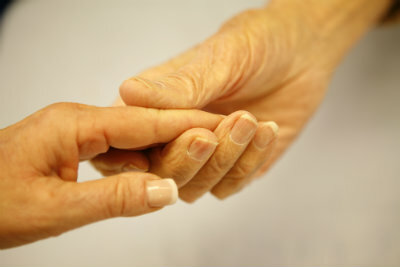
Palliative and Hospice Care: Know Your Options!
November is National Hospice and Palliative Care Month. During this time, hospices across the country are reaching out to raise awareness about the highest quality care for all people coping with life-limiting illness. This year’s theme is Know Your Options!
Being aware of your options before a medical crisis can help ease some of the stress that most people experience in that situation.
The Los Angeles Jewish Home offers both palliative and hospice services through Skirball Hospice and the Jewish Home Center for Palliative Medicine. Let’s take this opportunity to explore what each service offers.
“Palliative” means to relieve or lessen without curing. Palliative medicine is often thought of as only a part of hospice care provided to someone who has been diagnosed with a fatal disease or illness. While it is a crucial component and indeed grew out of hospice care, palliative medicine is a much broader specialty and can treat patients in various stages of their illness, including alongside curative treatment. Palliative care can be provided in a hospital, cancer center, nursing home, outpatient clinic, hospices, or in the patient’s home.
Focusing on the symptoms of both the disease and the treatment, palliative care helps with a wide range of issues. These may include pain, depression, anxiety, fatigue, shortness of breath, constipation, nausea, loss of appetite, and difficulty sleeping. It also helps an individual to gain the strength to carry on with daily life and can help improve the ability to tolerate medical treatments. Palliative care also gives an individual more control over their care by improving their understanding of treatment options.
Compassionate end-of-life care, provided by hospice services, enables individuals and their families to overcome fear and discomfort, to cope with loss, and to embrace the experience and value of each and every day of life. Hospice care recognizes the needs of patients who choose to remain where they live, outside of the hospital, so they can be surrounded by loved ones when hospitalization is no longer expected to cure their illness. It provides the support that allows someone to spend the last stages of their life in a loving environment, comforted by friends and family, and free from discomfort.
While the use of hospice care has increased over the years, many people are still uncertain about the type of services available and when they can be accessed. Hospice is for anyone facing a life-limiting illness. Patients and their families receive care for an unlimited amount of time, depending on the course of the illness. Family members are encouraged, supported, and trained by hospice professionals to care for their loved ones. Hospice staff is on call to patients and their families 24 hours a day, 7 days a week, to help care for their loved ones. Medicare beneficiaries pay little or nothing for hospice care. Most insurance plans, HMOs, and managed care plans cover hospice care. Bereavement services and grief support are available to family members for up to one year after the death of a patient. At Skirball Hospice, this support is available for thirteen months.
Both the Jewish Home Center for Palliative Medicine and Skirball Hospice provide compassionate care and expertise through an interdisciplinary team, including physicians, nurses, rabbis, medical social workers, registered dieticians, and certified home health aides.
To learn more about your options, please visit our website at www.skirballhospice.org or call (877) 774-3040.
Oct
27

New Siddurim for a New Age
The siddurim, or prayer books, at the Los Angeles Jewish Home were worn with over three generations of use, lovingly touched by thousands of hands over the years. Through countless Shabbat and holiday services, the siddurim provided a foundation for seniors and their families to pray, celebrate, and mourn.
Now, through the generosity of supporters of the Jewish Home, the residents have new siddurim, ready to serve them for many years to come. Rabbi Karen Bender, Skirball Director of Spiritual Life, explains how this came to be. “When my predecessor, Rabbi Anthony Elman, began his retirement, he left behind his Rabbi’s discretionary fund. After many discussions about how to best use these funds, we agreed the purchase of new siddurim would benefit our seniors in so many ways.”
And they are more than just new. While the prayer books are Conservative-based, as were the ones they replaced, they offer several important improvements:
Transliteration: Many of our seniors who enjoy coming to services read English only. The most significant parts of the service are now available in transliteration so everyone can participate.
Gender inclusive language: The new siddurim avoids referring to G-d as “Him” and uses more inclusive language, such as referring to our foremothers by name in addition to our forefathers.
Contemporary translations: The prayer books offer accessible, modern and poetic English translations and readings that are very spiritually uplifting.
A great deal of research and effort went into selecting the siddurim. “We were careful to consider the size and weight of the book, as well as font boldness and clarity in both Hebrew and English,” says Rabbi Bender. “As you can imagine, there were many to choose from. I requested input from our seniors and Rabbi Ron Goldberg of the Eisenberg Village campus. In the end, we chose the 2016 printing of Siddur Hadash.”
Fortunately, the discretionary fund was large enough to purchase siddurim for both campuses, which is especially important due to the fluidity of our seniors between campuses.
In honor of Rabbi Elman, who is remembered with great fondness by both Jewish Home seniors and staff, a bookplate was placed in each siddurim, thanking him for his years of services.
“It’s a “Shehecheyanu” moment,” exclaims Rabbi Bender, “a moment of arriving at a special time!”
Oct
27
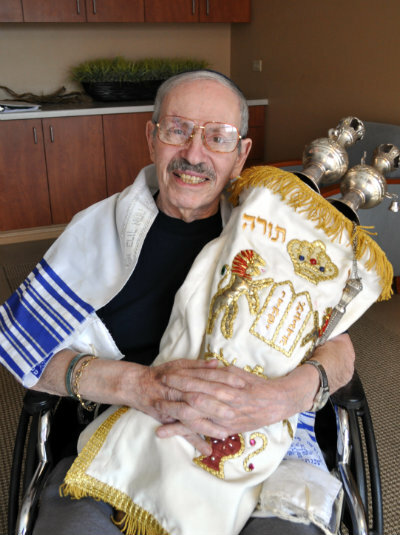
Celebrating Simchat Torah at Grancell Village
On Monday, October 24, Grancell Village residents celebrated Simchat Torah, or the “Rejoicing of the Torah.” During the celebration, 88-year-old Jewish Home senior John Sinasohn was one of several seniors to carry the Torah for the seven “Hakafot” processions it made around the Grancell Village synagogue.
“Dancing with the Torah is a thrill,” he says. “It’s a blessing to touch and hold the scrolls. I know my parents would be proud.”
John has had the opportunity to hold the Torah on this special holiday once before.
“The last time I held a Torah like this was in Germany in the year 1938.” John recalls, “My father was very involved in our synagogue. That year, we were given the honor of carrying the Torah during Simchat Torah. Less than a month later, the synagogue was burned down during Kristallnacht.”
Shortly after this act of violence, John’s parents sent him out of Germany. After traveling through Belgium, France, and Portugal, John moved to an orphanage in Los Angeles in 1943. Later, John met his wife Violet and took work as a writer, lawyer, and judge. John eased into retirement, working part-time fixing broken televisions before moving to the Home’s Joyce Eisenberg-Keefer Medical Center in 2011.
Here at the Home, John enjoys spending time with his wife and attending weekly lectures and services every Friday and Saturday and during the holidays.
“I’ve been lucky all my life. God has been very good to me.”
Oct
3
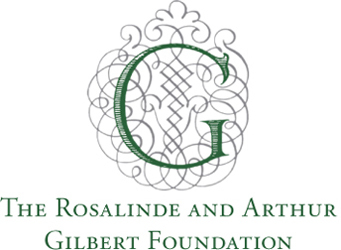
Gilbert Foundation Grant Supports Employee Education on Alzheimer’s Disease
The Goldenberg•Ziman Special Care Center at the Jewish Home provides exceptional care for individuals with Alzheimer's disease and dementia, and support for their families. The Center is known for its award-winning design, pioneering practices and technologies, and compassionate care.
One way the Goldenberg•Ziman Center excels in specialty care for seniors with Alzheimer’s disease and dementia is through employee instruction and training. Since its opening in 2002, the Goldenberg•Ziman Center has incorporated the “universal-worker” concept, where all staff members are involved in the residents’ care.
To continue the tradition of excellence at the Center and in the Home as a whole, further staff education was needed. A grant from the Rosalinde and Arthur Gilbert Foundation was received to make the training possible.
In order to develop a detailed Alzheimer’s disease caregiver training manual and toolkit, the Eisenberg Village (EV) administrative team partnered with University of California, Los Angeles associate professor and gerontologist Lené Levy-Storms, PhD.
Before selecting the curriculum for staff training, the administrative team surveyed the Home’s most experienced Alzheimer’s disease and dementia experts. After collecting data from 59 Jewish Home employees in one-on-one interviews, the team was able to capture valuable information about the staff’s best practices, personal experiences, and insights.
This information helped the Home’s administrative team create a detailed lesson plan that is now used in an extensive eight hour training session to be completed by all EV employees this month.
“These educational sessions are just one of the many ways we provide specialized training to our staff,” said Susan Leitch, community manager at the Goldenberg∙Ziman Special Care Center and Factor Nursing Building. “Our number one goal is to provide all of our seniors with the best care possible. Thanks to the generous grant from the Gilbert Foundation, we are able to give our staff the tools they need to serve our seniors with exceptional care.”
EV administrator Douglas Tucker considers the training session a fantastic learning experience for all employees. “By hosting educational sessions, our entire staff is able to benefit from the knowledge and experience of the Goldenberg•Ziman Center’s expert staff,” Douglas noted.
“The training we received provided me with clear guidelines on how to engage with seniors suffering from Alzheimer’s disease,” says Eisenberg Village certified nurse assistant Raquel Jaramillo. “Now I know how to learn from each individual and their unique situation in order to enhance their quality of care.”
For more information about the Jewish Home's Goldenberg•Ziman Special Care Center, please contact Susan Leitch, community manager, at [email protected] or (818) 774-3113 or visit our website.
Oct
3
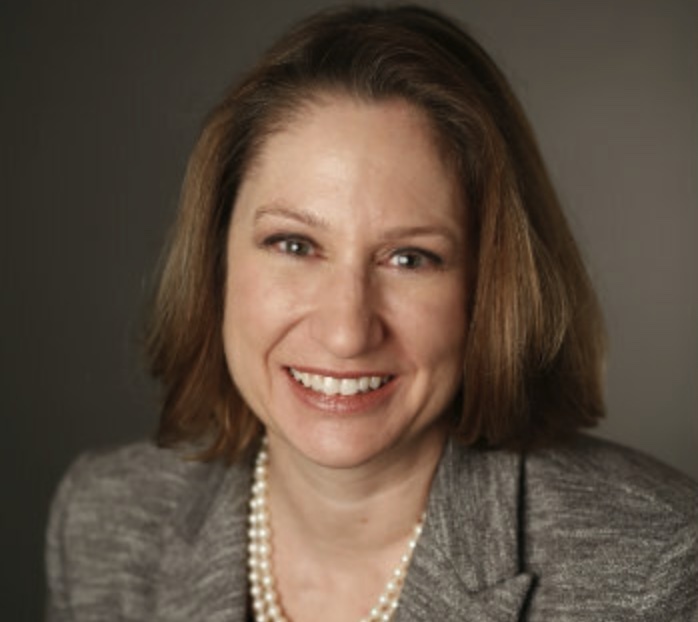
Employee Profile: Ilene Silberman
This spring, the Jewish Home was delighted to promote one of our own: Ilene Silberman, vice president of finance, has been elevated to the Home’s chief financial officer. In her new role, Ilene continues to showcase her talent and skills as a dedicated advocate on behalf of the organization’s sound fiscal health – maintaining our ability to serve thousands of Southern California seniors every year.
Ilene is a Certified Public Accountant and has over 25 years of combined experience in the accounting and finance fields. Before coming to the Home, she was controller for the Motion Picture Industry Pension & Health Plans (MPI), an agency that helps to administer defined benefit and defined contribution pension plans and provide health benefits to over 120,000 active and retired participants and their families. Ilene’s distinguished employment history also includes high-level positions in the commercial finance field with Wells Fargo Capital Finance, PNC Business Capital and Fleet Capital Corporation.
Ilene first came to the Home in 2015, but she is no stranger to the nonprofit community. A strong advocate for economic empowerment, she is a former volunteer tax preparer for elderly and low-income individuals. Ilene also served as an Executive Board Member and Vice President-Treasurer of the Emelita Street Elementary PTA, working to advance educational opportunities for young, school-aged children.
Ilene earned her BS in Business Administration – Accounting from California State University, Northridge, where she was on the dean’s list and served as an officer of the Accounting Association. She is married and has two children – a son and a daughter – and lives in Tarzana.
Sep
1
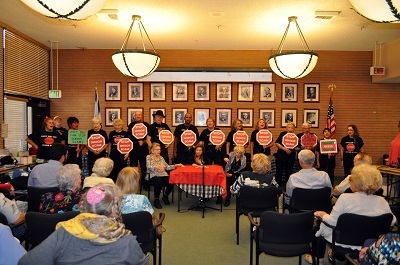
Stop Senior Scams Actors Perform at Eisenberg Village
On Thursday, August 4th, seniors from the Home’s Eisenberg Village campus gathered in the Zuckerman Boardroom to watch an informative performance from the Stop Senior Scams Acting Program.
Before the show began, 88-year-old Eisenberg Village resident and longtime Stop Senior Scams actress, Laurel Shapiro, was asked to take the stage. The Jewish Home senior was honored for seven years of dedication to the education of her peers. Field Deputy Tim Glick presented Laurel with a certificate from the office of Councilmember Bob Blumenfield and applauded her for her commitment.
Then, the group of talented performers acted, danced, and sang in a number of skits demonstrate the different ways scammers target seniors. A few of the common scams mentioned in the show were the grandchild, driver’s license, claim your prize, identity theft, online purchases, unpaid taxes, and obituary scams. At the end of each skit, actors shared important tips for avoiding scams like, if it sounds too good to be true it probably is; ignore unsolicited phone calls and emails that report to be the IRS; and memorize important numbers and leave confidential documents at home.
Using popular songs like the Rolling Stones’ You Can’t Always Get What You Want, Getting to Know You from the Rogers and Hammerstein musical the “King and I,” Abba’s Money, Money, Money, and the Supremes’ Stop in the Name of Love the troupe brought theatricality, laughter, and excitement to a commonly frightening and frustrating topic.
“One of the reasons our show works so well is because of the way we present the information.” longtime Stop Senior Scams actress Beverly Wyles says. “Our show is a memorable way to equip vulnerable seniors with the knowledge they need to protect themselves.”
The Stop Senior Scams Acting Program was founded by LAUSD acting instructor Adrienne Omansky in 2008. The one-of-a-kind troupe is comprised of 27 senior actors ranging in age from 60 to 98-years. Several of the group’s members write the skits they perform from experience. Each member of the group has, at some point, been the target or victim of a senior scam.
Program founder and director Adrienne has dedicated much of her time to educating Southern California’s seniors. In 2013, Adrienne and the senior scam group worked closely with the Los Angeles City Council to have one Thursday each May recognized as Senior Fraud Awareness Day in the city of Los Angeles. Adrienne explains importance of senior scam awareness. “Our program is here to share a serious message— fraud is everywhere and stopping senior scams begins with all of us.”
The group’s oldest actor, 98-year-old Peggy Mollin loves acting. She spends much of her time travelling with the group, visiting Los Angeles churches, temples, libraries, senior centers, and nursing homes, spreading the word about senior scams. “Over the years, I’ve lost a lot of money to insincere people.” Peggy shares, “I wanted to make sure the same thing wouldn’t happen to seniors like me.”
Jewish Home resident Joy Bernstein says, “This is a wonderful cause. There are a lot of seniors who aren’t aware of the tricks scammers have up their sleeves. Seniors everywhere should be able to watch this show and learn what to watch for.”
Laurel says, “The song at the end of the show gives seniors some wonderful advice. You can avoid a lot of scams when you—” She continues, singing to the tune of the Orlons’ 1962 hit Don’t Hang Up— “JUST HANG UP!”
Sep
1
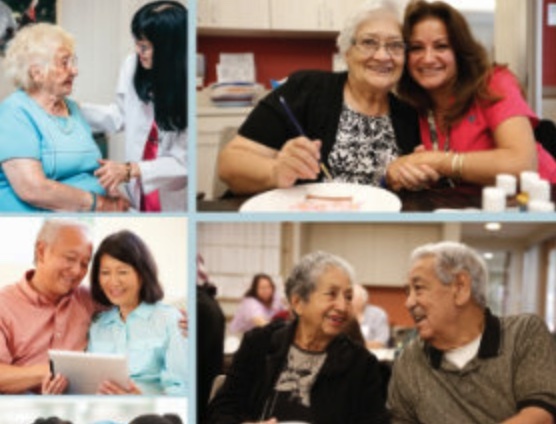
Jewish Home Hosts Nineteenth Annual Rhoda G. & Bernard G. Sarnat Symposium
For the nineteenth consecutive year, the Jewish Home will host its annual Sarnat Symposium on Wednesday, November 2, 2016. This year’s symposium, Creating Caring Connections for an Aging Society, will bring together some of the most progressive experts in the field of geriatrics to share their insight, research findings, and experience with social workers and other professionals who care for seniors. Six CEU credits are offered for those licensed as LCSW, MSW, MFT, BRN, NHAP, and RCFE.
Our diverse and dynamic speakers and topics include:
Freddi Segal-Gidan, PA, PhDUniversity of Southern CaliforniaWhat’s New in Alzheimer’s Disease and DementiaTim CarpenterEngAGEEngAGE: Transforming Senior CommunitiesDaniella Kaiserman, Esq.Borchard Fellow at Bet Tzedek Legal ServicesLegal Approaches to Elder Abuse: Advanced Planning, Restraining Orders, and Civil RemediesCathy A. Alessi, MDUniversity of California, Los AngelesSleep Interventions for Seniors: What Does the Research Tell Us?
In 1998, Rhoda and Bernard (of blessed memory) Sarnat made a generous gift to the Jewish Home to create an endowment to fund, in part, an annual conference on issues related to aging. The Rhoda G. & Bernard G. Sarnat Symposium was established to honor them and to promote the education of professionals in the field of geriatric care.
The Sarnat Symposium will be held at the Jewish Home’s Grancell Village campus located at 7150 Tampa Avenue in Reseda. Registration fee is $90 per participant. Senior and student discounts are offered. For more information, please click here.
Sep
1
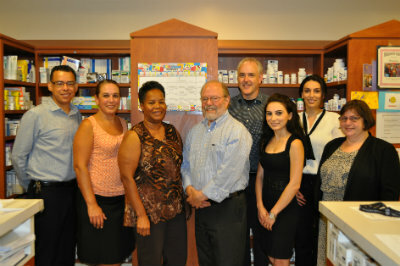
Honoring Our Own on World Pharmacists Day
On September 25th pharmacists all over the world will be celebrated in honor of World Pharmacists Day. This year’s theme is Pharmacists: Caring for You. The theme reflects the important role of pharmacists in providing care to the public and to highlight the emotional connection they have with their patients.
Among the unique and innovative services offered at the Los Angeles Jewish Home is an in-house pharmacy. Located in the Joyce Eisenberg-Keefer Medical Center (JEKMC) at Grancell Village, the Erwin Rautenberg Foundation Pharmacy plays a critical role in the lives of our seniors and the exceptional care they receive.
“It’s uncommon to have a pharmacy located in a nursing home,” says Bob Shmaeff, director of pharmacy services. “Proximity to our patients is a big advantage. We can deliver medications on a moment’s notice. It’s a full-service pharmacy geared to the needs of our seniors.”
The in-house pharmacy provides its staff the opportunity to review orders, confirm dosages, make sure medications are having the intended effects, and check for drug interactions and adverse drug reactions. “Because our pharmacy is located within JEKMC, our staff can visit with residents and establish one-to-one relationships. This helps create a connection and build trust. Our seniors know they can approach us at any time to share how they are feeling and ask any question they may have about their medications.”
“Bob and his team have been the recipients of several awards,” says Dr. Noah Marco, chief medical officer of the Jewish Home. “They participate in quality improvements efforts and mentor pharmacists that are completing their training. More importantly, our pharmacists make a difference in the lives of our residents by making sure each and every one receives the correct medication at the correct dose. They also ensure the resident’s doctor is aware of any potential safety issues regarding the prescriptions they write. Our residents love living at the Home, and our skilled pharmacists are a big part of the reason.”
Jerry Wahagheghe, director of nursing at JEKMC, shares Dr. Marco’s enthusiasm about the in-house pharmacy and its team. “It’s wonderful because there is no need to order medications from an outside pharmacy, which saves a great deal of time. Bob and his staff are amazing.”
“What I love most about my job at the Erwin Rautenberg Foundation Pharmacy is the ability to help our seniors live long, purposeful lives,” says Bob. “My staff and I have one goal: to deliver high quality pharmaceutical care to our residents. The end result is an average life span of 91 years at the Jewish Home, which is truly an accomplishment and a measure of success.”
We honor our amazing pharmacy staff who play a major role in providing high quality care to our seniors:
Robert Shmaeff, MPA Director of Pharmacy ServicesSean Boucher, PharmD Staff PharmacistJanice Hoffman, Pharmacist, PharmD Faculty in Residence Western UniversityMariam Khachatryan, PharmD Pharmacist ResidentAni Aramyan, PharmD, BCPS, CGP, Pharmacist for the Brandman CenterApril Gonzalez, TechnicianHenry Camas, TechnicianKathy Cardona, TechnicianJae Crawford, Biller/Technician